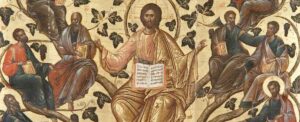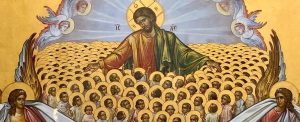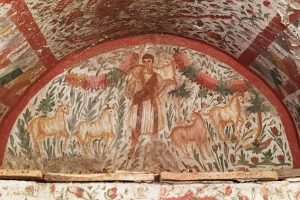This may not be of interest to many people; it’s this language nerd thinking about today’s Kontakion – the verse for today’s feast of Pentecost. The version we sang was:
When the Most High came down and confused the tongues, he divided the nations.
But when he distributed the tongues of fire, he called all to unity.
Therefore with one voice we glorify the all-Holy Spirit.
Ότε καταβάς τας γλώσσας συνέχεε διεµέριζεν έθνη ο Ύψιστος.
Ότε του πυρός τας γλώσσας διένειµε εις ενότητα πάντας εκάλεσε.
Καί συµφώνως δοξάζοµεν το Πανάγιον Πνεύµα.
In Acts 2:3-4, Saint Luke says there appeared to the apostles tongues, which were divided or distributed, and which were something like fire, and which came and sat on each of them. And they were all filled with the Holy Spirit, and began speaking in other languages, as the Spirit gave them utterance. (Orthodox readers will naturally make a connection between these tongues which are “something like fire” and the Uncreated Light, the firsthand experience of the God of Sinai and Tabor, whom the apostles are receiving in a new and powerful way.)
In European languages we use the word “tongue” both for the organ in the mouth and for *language* (langue, lengua, linguistics…) That makes us naturally see a parallel between the visible tongues of fire and the spoken utterances in other languages. (When singing this in the Cebuano language of the Philippines, there wasn’t any way to represent that; the words for language and mouth-organ are completely unrelated.)
“When the Most High came down and confused the tongues,” uses our word “confuse” which today means something like bewilder or perplex. But it comes from a word for melting things together. Latin confundere meant “jumble together, bring into disorder.” The Council of Chalcedon uses inconfuse in its Latin definition to describe how in Christ the human and divine natures are known “without confusion, without change, without division, without separation.”
In the Pentecost Kontakion, the word is synechee, from syn (together) and echein (to have or hold) and as an adjective it usually means something is continuous. But as a verb it can also mean to obliterate or demolish, pour together, confuse or blur something; when used of a person’s mind, it means to trouble it. These two aspects make me think of God scrambling the speech of the tower-builders like eggs.
That makes an interesting contrast between the first and second lines, so that very inelegantly the Greek looks like:
When coming down, the tongues stirring up, the Most High divided nations.
When the fiery tongues dividing, to unity all he called.
And the writer finishes with the word symphonos – speaking with one voice – to confirm that Pentecost is the healing of Babel:
And with one voice we glorify the all-holy Spirit.






